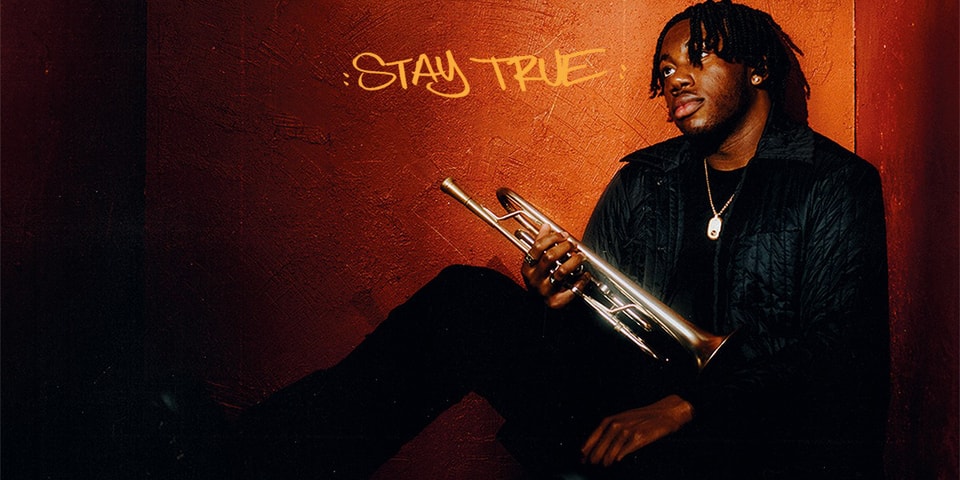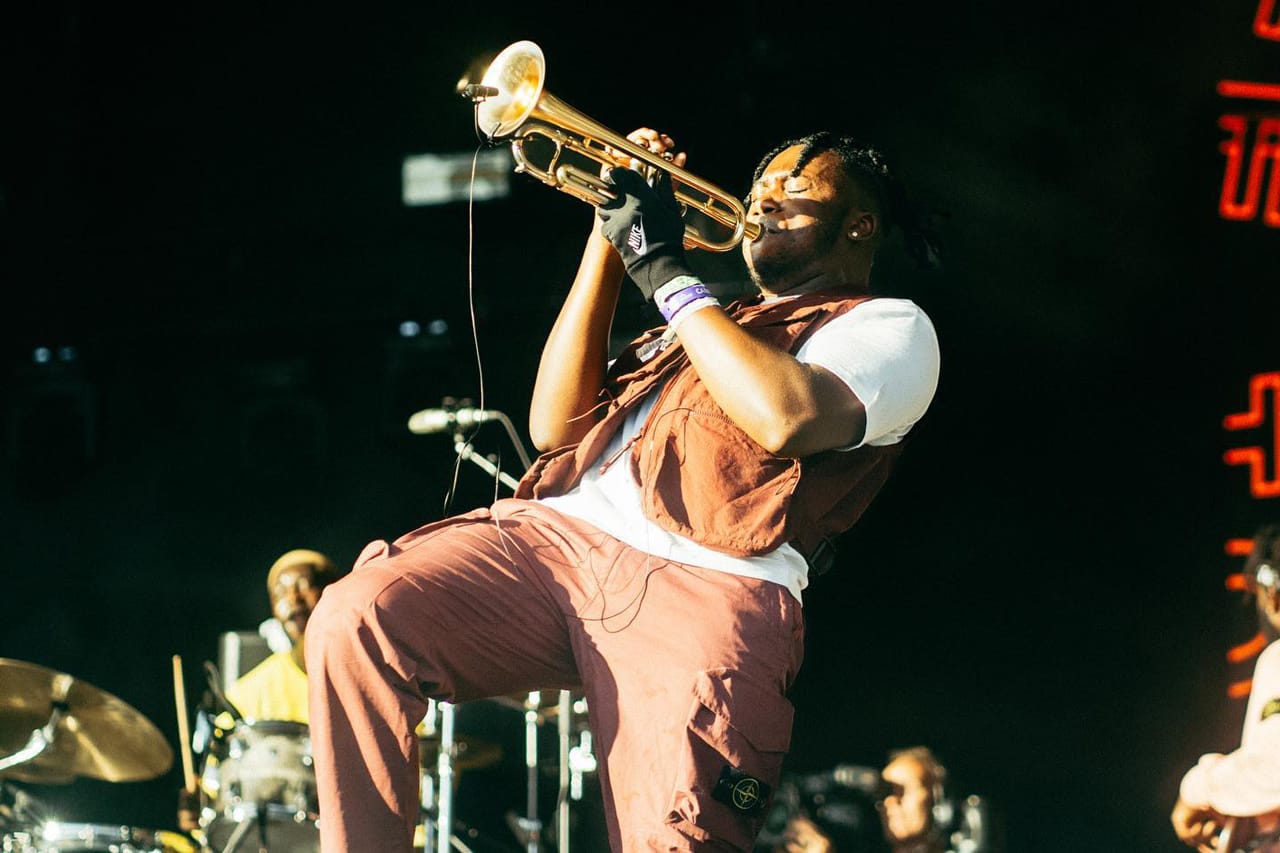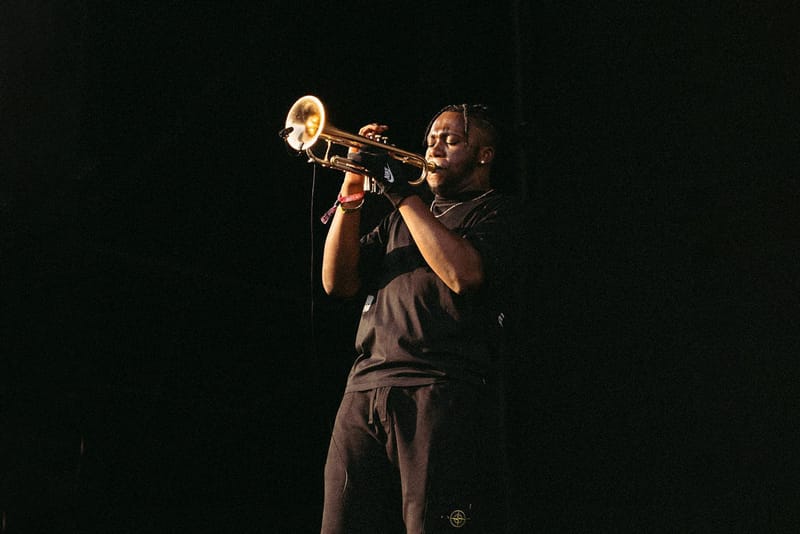Ife Ogunjobi Is Staying True with His Debut LP

What does “Stay True” mean to you? To Ife Ogunjobi, it means finding the power in your experiences and knowing there’s only one you in the world. “If you do your own thing and find your own audience, you’ll be surprised at how many people will listen to your story — and how many people it’ll resonate with,” he says.
Ogunjobi is best-known as the trumpeter for Ezra Collective, and spoke to Hypebeast less than 24 hours after the band received the 2023 Mercury Prize for its album Where I’m Meant to Be, an upbeat musical gumbo of jazz, afrobeat, calypso, reggae and more, on which his soaring, joyful and dexterous playing is a constant standout. “It’s mad, man,” he says, of the project being the first-ever jazz album to win the award. “I still haven’t fully processed it yet.”
But besides the Mercury Prize, Ogunjobi has another milestone to discuss: the release of Stay True his first project as a bandleader. Over the course of the five-track EP, Ogunjobi blends his Nigerian heritage with his South London influences, dipping into what he’s learned from Ezra Collective, his work with artists like Wizkid and Noname and the teachings of his “trumpet heroes” like Clifford Brown and Miles Davis to create a breezy, refreshing five-track project that’s both heartfelt and musically dense, with triumphant melodies soaring above locked-in grooves and percussion that’s equal parts Lagos and London.
With Stay True available on streaming platforms and vinyl, check out Ife Ogunjobi’s conversation with Hypebeast on everything from blending modern production values with old-school thematic structure to how he aims to connect with the modern jazz audience.
Shenell Kennedy/Sam Adjaye
Things are moving for you right now: Ezra Collective just won the Mercury Prize and now Stay True, your debut project as a leader is about to drop. How’s it all feel?
There’s a lot going on, man. But the main thing I’m feeling is gratitude. I’m really grateful for all the people that invested their time in supporting me and can now see all their support come to fruition. I’m proud of what I achieved, of course, but I’m just as proud about all the people that helped me achieve it.
What sparked you to start working on Stay True, and when did you begin putting it together?
My band and I have been doing shows for about three or four years when I’m not on tour with Ezra Collective or working with other artists, but we started working on Stay True in 2021. The strictest COVID lockdowns in London were over by then, but the future was a bit uncertain. Combine that with January being the perfect time for musicians to record regardless because nobody’s really touring then. I had written some music I wanted to put out, and that just felt like the perfect time to record it.
Temi Adegbayibi
You’ve played hundreds of live shows. How different are the touring and recording headspaces for you?
In my opinion, a live show is all about the interaction with people. It’s a beautiful experience to see so many different people together. They may not have that much in common, but they all come together for one purpose, which is the music. So when I’m playing live shows, my attention is focused on making sure the people are getting what they need to get in that moment. But when I’m making records in the studio, I’m trying to create something that’s timeless. I want to create a record that will resonate with people when they listen to it the not just the first time, but the fifth time, the 50th time, the 100th time. It’s all about how music makes you feel in either circumstance, the main difference is that live the impact needs to be immediate while on record it needs to have more longevity.
Do you have a trumpet “hero” or main influence? Dizzy? Clifford Brown? Miles?
Ah, man. There’s … there’s a few [laughs]. The reason I started playing the trumpet was because I got to see a Hugh Masekela concert in London when I was about 10 years old. That was my first time hearing the trumpet and flugelhorn being played, and something about the energy of the trumpet drew me in. Hugh was a really early hero for me, but I was also listening to a lot of Louis Armstrong when I was young because my dad had a couple of his CDs in the house. The first time I heard Freddie Hubbard, I was like “woah.” He’s a trumpet genius, man. He’s so firey when he plays his trumpet and that’s had a massive influence on me. Wynton [Marsalis], Miles [Davis], Clifford Brown. I learned a lot about jazz from studying Clifford Brown.
“When I write a melody, especially for the trumpet, I want it to be quite triumphant and quite memorable. There needs to be a statement when the melody comes in.”
The reason I wanted to ask you about your trumpet “heroes” and influences is because Stay True has this really interesting blend of modern production values and rhythms, but it’s combined with what seems like an old-school approach to thematic structure that makes the melodic themes really memorable. How did you come to that combination?
That’s quite an interesting question. I like that. I don’t think that combo was deliberate, but I do think it’s something that comes from how I am as a person and how I hear music, especially the trumpet. When I write a melody, especially for the trumpet, I want it to be quite triumphant and quite memorable. There needs to be a statement when the melody comes in, and it should be something that the audience can sing back to you. Especially because there are no lyrics in most of my music, it’s got to hit quickly. The melody can be a great tool to make something that’s recognizable to any listener. No matter if you’re listening to Stevie Wonder or a jazz standard, you can recognize a catchy melody even if you don’t know what’s going on [in a technical sense] with the rest of the song.
I’m a young man living in 2023, and I listen to loads of produced music from Afrobeats to hip-hop, grime, garage and R&B, so I understand the importance of the production side as well, getting those beats and rhythms matched up with the beautiful melodies and the live instrumentation of what we jazz artists do. The beat is the bedrock, the overall tone of the music, and the melody is the actual story on top. I love the beauty and intricacy of jazz music, but I also love going to a party and dancing my head off to beats [laughs].
Shenell Kennedy/Sam Adjaye
Besides the melodies, the percussion is a key piece of the project. How do you manage the interplay of the percussion and the melody, and where does the inspiration for the percussion come from?
I’m Nigerian, so a lot of the sounds are based off of Nigerian and African culture, everything from Afrobeats to Fuji and Highlife music plus Fela Kuti-style Afrobeat [Editor’s Note: Afrobeats and Afrobeat are seprete musical styles]. There’s an amazing talking drum player on the EP named Moses Olukayode — he plays in my band as well, and is responsible for all the crazy percussion you’ll hear on the EP. The talking drum is one of the most unique instruments you’ll find anywhere. It’s a vibe from the first second you hear it, and it’s both a rhythm and pitch instrument so not only do you get a of bounce from it, but you can have it interact with a lot of other instruments.
If we’re talking about drums, we have to discuss bass as well. There are a lot of great bass groves on Stay True, but the bassist, Mutale Chashi, also provides a lot of melody and counterpoint.
That’s because Mutale is one of the finest bass players in the world. He’s such a great listener, and always knows when it’s time to just hold the groove or when it’s time to get into some funky stuff.
Moving on from bass to keys, there’s one moment that really stands out. Much of Stay True offers a beautiful, unbroken flow, but there’s a very interesting piece of the solo on “Standing Here” that offers dissonant chord voicings and jagged rhythms in a way that’s reminiscent of Thelonious Monk. Where did the inspiration for that come from?
That’s Deschanel Gordon on the keys, and he’s able to do something like that because he has a deep understanding of jazz, but also a deep understanding of genres like hip-hop. He’ll draw on guys like Herbie Hancock and Thelonious Monk, but throw his own twists in there. So, exactly like you said, you’ll hear those references in the dissonant cords that might be inspired by a jazz legend but then the jagged rythyms are a nod to dance music. You have a great player with a bunch of great influences, and that’s what you’ll get.
“A Better Place,” the EP’s closing track, is the only one with a vocal performance and features a back-and-forth between a male and a female vocalist. Was a different musical approach taken on that song as opposed to the others on the EP?
Those lyrics were actually taken from a poem I found that really spoke to me. It’s called “A Better Place,” just like the track, and is about channeling the energy that goes into tragedies like knife crime into something better. It has this intense tragedy and darkness to it, but also this beautiful message and a light at the end of the tunnel. I thought the words of the poem would translate very well if they were sung, so I had SUR NATE [the male voice] and Richie [the female voice] sing them back and forth. The way they soar over that beat that’s grooving underneath was my way of interpreting the balance between the two parts of the poem.
Temi Adegbayibi
Stay True is your first project as a leader. How did the process of working on this differ from your work with Ezra Collective or the songs you’ve worked on with Wizkid and Noname?
The main difference is that I’m doing Stay True all by myself. There’s no label involved, just my supporters I mentioned before being very generous with their time and their resources. There’s more direction involved — besides actually making the album, I’ve got to help conceptualize the artwork, figure out what singles to put out and when, sort out a vinyl release, figure out what shoes we want to do after it’s out, directing it in that way.
With Ezra [Collective], there are five of us so that’s a more collaborative experience and the decisions are all made as a group. Those guys are my brothers, so I feel like I know what they’re going to say before they say it sometimes. If I’m working with one of those artist you mentioned, there will be involvement from both them and their producers, like they’ll play me a beat and we’ll figure out where to put trumpet on top of it. By myself, it’s getting that support for a vision that’s strictly from me. All three things are beautiful experiences in and of themselves.
As a leader, did you feel any additional pressure that you hadn’t felt before?
I feel like I would have if I wasn’t doing it by myself — and giving myself as much pressure as I could handle. If I had a single dropping in a week, I’d have to tell myself “Bruv, you need to sort this out,” where if I was doing this project with a label it would be more like “OK, we need to hit these streaming numbers and sell this many copies.” The industry side of recording and releasing music can be really tough after you’ve already completed the creative side. It’s been mad to not have that outside pressure and be able to make the music the way I wanted to, put it out the way I wanted to and let people receive it in the way I wanted to. There’s nobody telling me “OK Ife, this needs to be #1 in the UK!” [laughs]. The project is titled Stay True for a reason, and that’s because it’s about the power of staying true to oneself. Because of that, putting it out myself just felt like a more honest way to say “This is me.”
“At the end of the day, jazz — and all music, really — is about human expression.”
Jazz is constantly amalgamating. What do you think the best way to communicate with the modern jazz listener is?
Just being honest in your music, and not replicating the legends that came before you too closely. The reason they became legends is because they weren’t trying to be anyone but themselves. That’s why I had so many answers to your question about “trumpet heroes” earlier. Freddie Hubbard, Wynton Marsalis, Clifford Brown, Donald Byrd, Woody Shaw, it goes on and on. They all play the same instrument but do it in such different ways because they’re just being true to who they are.
At the end of the day, jazz — and all music, really — is about human expression. As long as you’re being true and honest with that expression, it should resonate with the people that want to listen to you.
What do you hope a listener takes away from this project?
The power of knowing that there’s only one you in the world. If you do your own thing and find your own audience, you’ll be surprised at how many people will listen to your story — and how many people it’ll resonate with. That applies to everyone too, not just musicians and creatives. Don’t live your life trying to be someone else. There’s power in your experiences, your morals and what you believe in. Cherish that.
Stay True Credits
Ife Ogunjobi: Trumpet/ Executive Producer
Deschanel Gordon: Piano/Keys
Mutale Chashi: Bass
Zoe Pascal: Drums
Moses Olukayode: Talking Drum/Omele/Percussion
Richie (Richie Seivwright): Vocals
SUR NATE (Nathan Mills): Vocals
Produced, Mixed and Engineered by Tom Excell
Assistant Engineer: Luke Farnell
Mastered by Peter Beckmann at Technology Works
Source: Read Full Article



